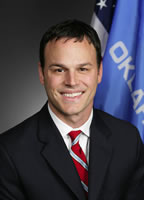In order to provide equal access and equal opportunity to people with diverse abilities, this site has been designed with accessibility in mind. Click here to view
Rice Offers Veterans Health Insurance Plan
 Senator Andrew Rice
Senator Andrew Rice
Noting that about one of every eight veterans under age 65 are uninsured, State Senator Andrew Rice (D-OKC) today announced he is introducing legislation this year creating the Oklahoma Veterans’ Health Insurance Program.
“Most people assume that all veterans qualify for free health care through the U.S. Veterans Affairs Department,” Rice said. “Sadly, that’s not true and when the legislature sets our priorities at the beginning of this session, Oklahoma’s military veterans deserve to be at or near the top.”
Rice said the insurance program he has fashioned will not be free. Veterans will be required to pay premiums and co-payments based on their household income. According to the latest census data, there are a total of approximately 340,000 veterans living in Oklahoma. A Harvard Medical School study recently estimated that one in eight veterans is uninsured.
“These are veterans who fall through the cracks—too poor to afford private coverage but not poor enough to qualify for Medicaid or means-tested VA care,” Rice said. “I believe every American military veteran has earned the right to qualify for some form of health insurance.”
Rice said that in lieu of a federal initiative making all veterans eligible for health care benefits, states like Oklahoma have the opportunity to take care of their own.
"Senator Rice deserves a lot of credit for noting a serious problem in Oklahoma, and tackling it," said Jon Soltz, an Iraq War Veteran, and Chairman of VoteVets.org, a pro-military political group. "Hopefully, the day will come when the Federal government guarantees health insurance and care for every veteran.”
Under Rice’s plan, the Veterans’ Health Insurance Program would be administered by the Oklahoma Department of Veterans Affairs. Its scope would be contingent on availability of funds. To be eligible, veterans must be between 19 and 65, prove they don’t qualify for Medicaid or means-tested VA care and can’t afford private insurance. Veterans can lose eligibility if they don’t make timely payment of their premiums. Veterans are not eligible if they live in a nursing home or an inmate correctional facility.
The bill instructs the State Department of Veterans Affairs to make rules that determine individual cost-sharing by veterans based on their household income.
Rice said that because his veterans’ health care plan involves new costs, he expects to face obstacles in a year when budget constraints are tight. However, he vowed he is undeterred by arguments that Oklahoma can’t afford to take care of its veterans.
“Our state has traditionally been among the nation’s leading states in number of troops deployed around the world,” Rice said. “As citizens, we can show our appreciation by taking care of them when they return home.”
According to figures released last week by the Department of Defense. Oklahoma currently has 3,368 members of the National Guard and Reserves on federal status. That puts the state third, after Indiana's 4,515 and California's 3,914.
 Oklahoma Senate
Oklahoma Senate

